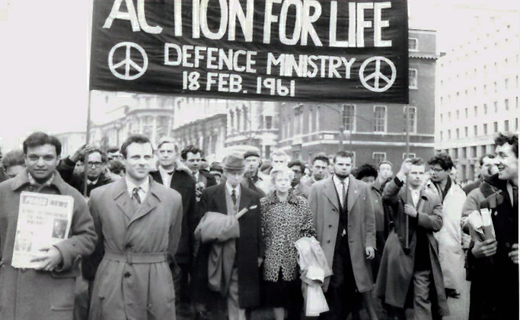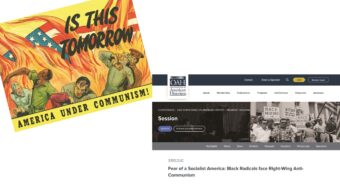
On this date in 1955, citing a world “full of conflicts; and, overshadowing all minor conflicts, the titanic struggle between Communism and anti-Communism,” British philosopher Bertrand Russell released the so-called “Russell-Einstein Manifesto” co-signed by 11 prominent scientists, three months after Albert Einstein’s death. Einstein had agreed to put his name to it in his final days. Issued at the height of the Cold War, the manifesto urged nations to find peaceful ways to settle differences and to renounce the use of nuclear weapons, which only promised “universal death.”
The concluding passages of the manifesto read as follows:
Although an agreement to renounce nuclear weapons as part of a general reduction of armaments would not afford an ultimate solution, it would serve certain important purposes.
First, any agreement between East and West is to the good in so far as it tends to diminish tension. Second, the abolition of thermo-nuclear weapons, if each side believed that the other had carried it out sincerely, would lessen the fear of a sudden attack in the style of Pearl Harbor, which at present keeps both sides in a state of nervous apprehension. We should, therefore, welcome such an agreement though only as a first step.
Most of us are not neutral in feeling, but, as human beings, we have to remember that, if the issues between East and West are to be decided in any manner that can give any possible satisfaction to anybody, whether Communist or anti-Communist, whether Asian or European or American, whether White or Black, then these issues must not be decided by war. We should wish this to be understood, both in the East and in the West.
There lies before us, if we choose, continual progress in happiness, knowledge, and wisdom. Shall we, instead, choose death, because we cannot forget our quarrels? We appeal as human beings to human beings: Remember your humanity, and forget the rest. If you can do so, the way lies open to a new Paradise; if you cannot, there lies before you the risk of universal death.
Resolution:
We invite this Congress, and through it the scientists of the world and the general public, to subscribe to the following resolution:
“In view of the fact that in any future world war nuclear weapons will certainly be employed, and that such weapons threaten the continued existence of mankind, we urge the governments of the world to realize, and to acknowledge publicly, that their purpose cannot be furthered by a world war, and we urge them, consequently, to find peaceful means for the settlement of all matters of dispute between them.”
Aside from Russell and Einstein, the other signatories included: Max Born, Percy W. Bridgman, Leopold Infeld, Frederic Joliot-Curie, Herman J. Muller, Linus Pauling, Cecil F. Powell, Joseph Rotblat, and Hideki Yukawa.
Adapted from Chase’s Calendar of Events and other sources. At this site, you will find the complete manifesto.
Photo: Bertrand Russell leads an anti-nuclear march in London. | Wikipedia (CC)












Comments